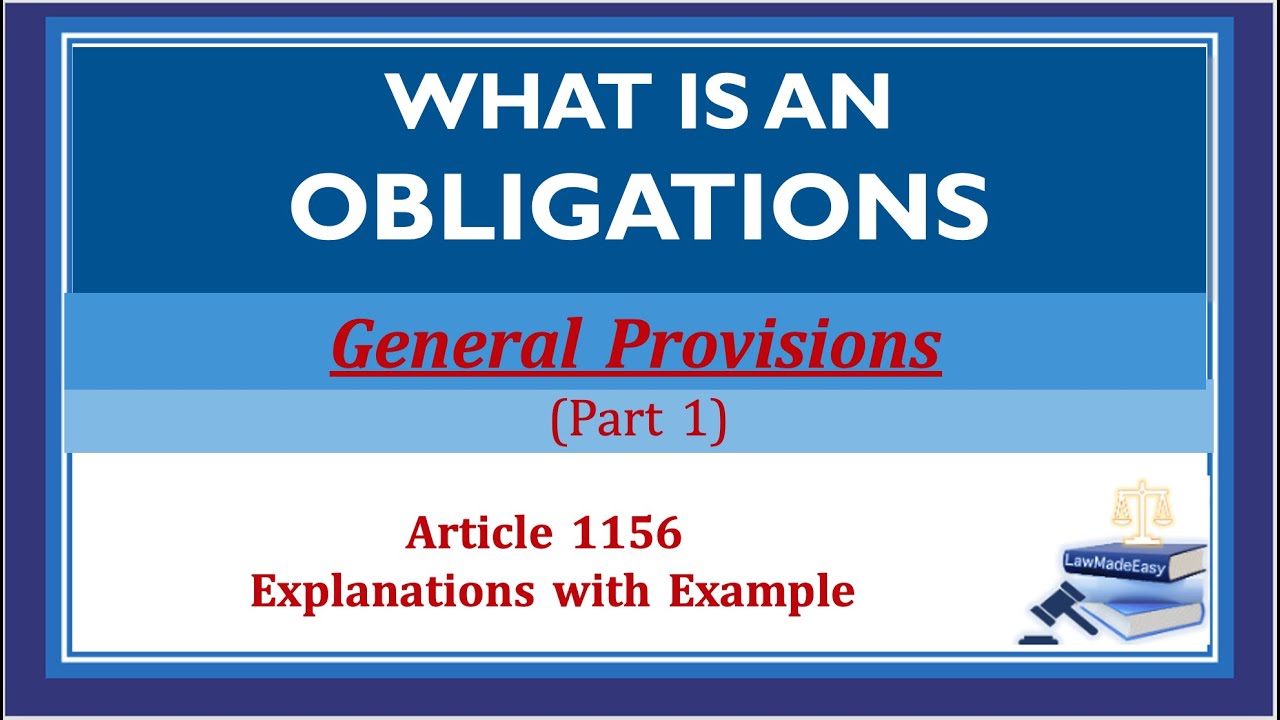Pure and Conditional Obligations
Summary
TLDRThis video discusses different types of obligations under the Civil Code of the Philippines, focusing on pure and conditional obligations. A pure obligation is one that is demandable immediately, without conditions or terms, such as a promise to deliver something. A conditional obligation depends on the occurrence of a future, uncertain event. The video covers various classifications of conditions, such as suspensive, resolutory, and potestative, and explains how these affect the validity and demandability of obligations. Practical examples are provided to clarify these legal concepts.
Takeaways
- 😀 Pure obligations are those that do not have a condition or period, making them immediately demandable.
- 🤔 Conditional obligations depend on the occurrence of a future uncertain event to be demandable or extinguished.
- 💻 An example of a pure obligation is the promise to deliver something without any conditions, such as 'I will give you 1,000 pesos.'
- 🎓 An example of a conditional obligation is 'I will give you my laptop if you pass the CPA examination,' where the condition is the passing of the exam.
- ⏳ Conditions can be classified into suspensive (giving rise to an obligation) and resolutory (extinguishing an obligation).
- 🔄 Potestative conditions depend on the will of one of the contracting parties, while casual conditions depend on chance or a third party's will.
- 🚫 Impossible conditions make both the obligation and the condition void if they cannot be fulfilled by nature or by law.
- 💍 Positive conditions require an event to happen, while negative conditions require an event not to happen for the obligation to be fulfilled.
- 🛑 Divisible conditions can be partially fulfilled, while indivisible conditions must be fulfilled entirely for the obligation to be valid.
- 🎲 Mixed conditions depend partly on the will of one of the contracting parties and partly on a third party or chance, making the obligation valid.
Q & A
What is a pure obligation?
-A pure obligation is an obligation that has no term or condition and is immediately demandable. It can be fulfilled or demanded right away.
Can you give an example of a pure obligation?
-An example of a pure obligation is when X obliges himself to deliver his only car to Y. Since no condition or term is attached, it is immediately demandable.
What is a conditional obligation?
-A conditional obligation is one whose demandability or extinguishment depends on the happening of a future and uncertain event, known as a condition.
Can you provide an example of a conditional obligation?
-An example of a conditional obligation is: 'I will give you my laptop if you pass the CPA examination.' The obligation depends on the fulfillment of a condition (passing the exam).
What is a suspensive condition?
-A suspensive condition is a condition that must happen before the obligation becomes demandable. The obligation is suspended until the condition is fulfilled.
What is a resolutory condition?
-A resolutory condition is a condition where the obligation is demandable immediately but will be extinguished if the condition occurs. For example, 'I will let you use my car until you pass the CPA examination.'
What happens if the condition is dependent on the will of the debtor?
-If the condition is suspensive and depends entirely on the will of the debtor, the obligation is void. If it is resolutory, the obligation remains valid.
What is an impossible condition, and how does it affect an obligation?
-An impossible condition is one that cannot be fulfilled either by nature or due to law. If the condition is impossible, both the condition and the obligation are void.
What is the difference between a positive and negative condition?
-A positive condition is a condition where an event must happen, while a negative condition is one where an event must not happen for the obligation to take effect.
What is the difference between a divisible and indivisible condition?
-A divisible condition is capable of partial performance, meaning part of the obligation can still be valid if the impossible condition affects only a portion. An indivisible condition cannot be partially performed, and all conditions must be fulfilled to demand the obligation.
Outlines

هذا القسم متوفر فقط للمشتركين. يرجى الترقية للوصول إلى هذه الميزة.
قم بالترقية الآنMindmap

هذا القسم متوفر فقط للمشتركين. يرجى الترقية للوصول إلى هذه الميزة.
قم بالترقية الآنKeywords

هذا القسم متوفر فقط للمشتركين. يرجى الترقية للوصول إلى هذه الميزة.
قم بالترقية الآنHighlights

هذا القسم متوفر فقط للمشتركين. يرجى الترقية للوصول إلى هذه الميزة.
قم بالترقية الآنTranscripts

هذا القسم متوفر فقط للمشتركين. يرجى الترقية للوصول إلى هذه الميزة.
قم بالترقية الآنتصفح المزيد من مقاطع الفيديو ذات الصلة

Obligations with a Period

Dwi Aryanti Ramadhani, S.H., M.H. - HUKUM PERIKATAN (JENIS-JENIS PERIKATAN)

General Provisions - Obligations (Part 1)

When are you considered in delay? When are you liable for damages? (Articles 116-1170, Civil Code)

UPDATED DISCUSSION: What is an Obligation? Obligations and Contracts General Provision. Part 1.

Law on Obligations- Chapter 1
5.0 / 5 (0 votes)
